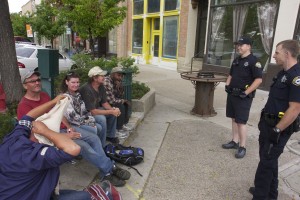
“Give a man a fish and you feed him for a day. Teach a man to fish and you feed him for a lifetime.”
This famous aphorism is exactly what Provo City officials want to communicate to citizens as panhandling has recently increased within city limits.
Provo City Council is considering passing an ordinance that will prohibit financial transactions through running car windows, with the exception of fast food and banking drive-thrus. Their goal is to put an end to panhandlers appraoching stopped cars along Center Street and asking for money.
Derik Flanary, a business strategy major from Highland, vocalized a concern facing many Provo residents who encounter panhandlers.
“If I don’t give money, then I feel like I’m judging them. And if I do give them money, I feel like I’m feeding an addiction, but then I don’t want to make that generalization of all of them. It’s a tricky situation,” Flanary said, adding that he knows there are better ways to help panhandlers.
Signs went up in various locations throughout Provo in recent months, mostly along Center Street, that remind passersby of different ways to truly aid those on the streets in their fight against hunger and homelessness.
Within the city, there is a coalition of organizations, named Mountainland Continuum of Care, whose vision is to end homelessness. Mountainland calls upon housing, faith-based and service organizations within the public and private sectors for coordination.
Craig Severinsen, communications director of Community Action Services and Food Bank, believes that each person needs to personally decide how to help individuals in need.
“However, giving money to an organization such as Community Action can reach a lot farther than giving to an individual person,” Severinsen said in an email.
A simple burger and a drink cannot be purchased with just one dollar, Severinsen said, but Community Action “can stretch one dollar to provide six meals.”
“Community Action is focused on making our community strong and vibrant by making sure that the families in our community are self-sufficient,” Severinsen said.
There seemed to be a greater influx of panhandlers over the years. In Severinsen’s opinion, it began in 2008–2009, at the beginning of the recession.

“The recession hit our community just as hard as the rest of the country. Right now, 24 percent of Utahn’s don’t have a bank account,” Severinsen said. While this seems unrelated, “It is a sign as to how many Utahns are not saving money. If a crisis were to occur … these families would be the first to slip below the poverty line.”
Provo Police Sgt. Dan Dove said anytime unemployment goes up, the number of people on the streets increases as well, not just in Provo but throughout the county. However, individuals on the streets are not necessarily without a home.
“Those we have run into, they’re not homeless. They have apartments and cars,” Dove said. “They play to people’s humanity through signs. We’ve done some pretty extensive investigations that show criminal backgrounds and histories. We’ve been able to prove that.”
Dove said there is strict enforcement against aggressive panhandling and encouraged citizens to call the police if they are approached with force.
“(Panhandlers) can stand there as that’s a freedom of choice, but if they start affecting businesses, if they prevent people from going where they want to go and follow or harass them, that is when we step in,” Dove said.
The signs along Center Street attempt to put a positive spin on the dilemma, asking passersby to “give where you know it will make a difference.”
On the other side of the argument, the American Civil Liberties Union of Utah believes certain liberties of the panhandlers have been threatened. Several ordinances in major cities have been challenged and defeated by the organization.
“We are vigilant about prohibitions or laws that are passed that curb individual rights found in the First Amendment,” said Leah Farrell, ACLU staff attorney. “When people start criminalizing, that’s a red flag.”
Utah’s Commercial Solicitation Ordinance back in 2009 riled up civil libertarians throughout the state. The ACLU addressed the issue in a letter to former Salt Lake City Mayor Ralph Becker.
“(Mayor Becker’s) proposed ordinance purports to target ‘commercial solicitation.’ However, the Supreme Court of the United States has long recognized that charitable solicitations fall within a category of speech close to the heart of the First Amendment, distinguishable from ‘purely commercial speech,’” the letter read.
The letter went on to quote from Gresham v. Peterson, a case brought before the Seventh Circuit of the United States Court of Appeals: “While some communities might wish all solicitors, beggars and advocates of various causes be vanished from the streets, the First Amendment guarantees their right to be there, deliver their pitch and ask for support.”
Salt Lake City’s anti-panhandling law was cited as unconstitutional and struck down in early 2012.
Volunteer groups in Provo have been careful to stay away from the politics surrounding the issue.
“(Residents) can help so many more people if (they) give to an organization like Community Action,” Severinsen said. “So while everyone has to make their own decision about what is ‘right’ or ‘wrong,’ you will do more good by giving and volunteering. … Our community is compassionate, creative and innovative. Everyone here has the resources they need to make a real difference in their community in a way that is original and inspirational.”




